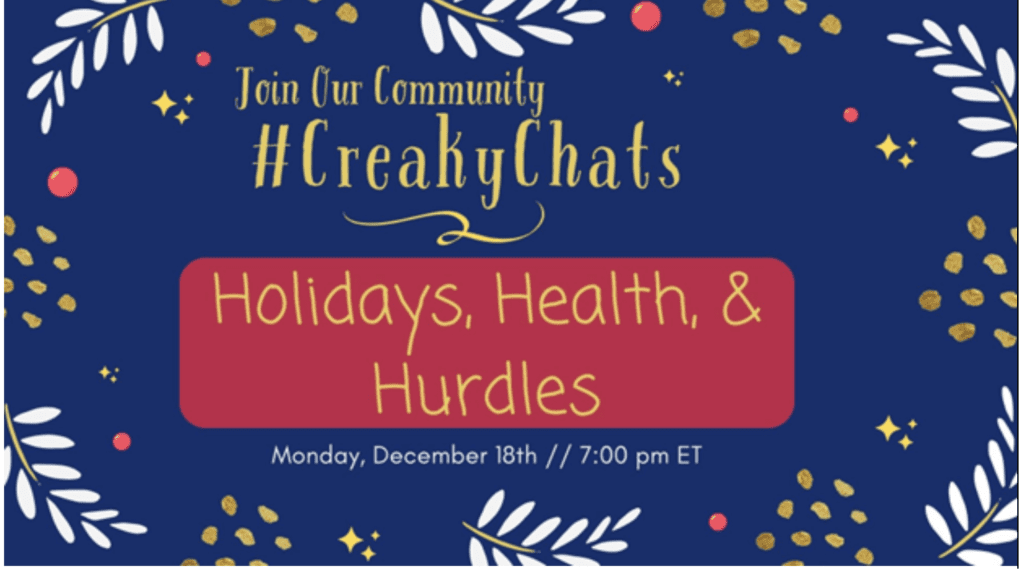As the holiday season approaches, we often find ourselves immersed in the joy and anticipation of cherished traditions. However, for those living with chronic health conditions like axial spondyloarthritis, psoriatic arthritis, rheumatoid arthritis, or lupus, this festive period can pose unique challenges.
In our recent #CreakyChats discussion titled “Holidays, Health, & Hurdles,” our community members generously shared their experiences and strategies for managing the holiday season. Now, let’s dive into their insights, strategies, and tips. Who knows, you might find a tip or two that works wonders for you, making this holiday season a little more enjoyable while prioritizing your health and well-being.
Evolving Traditions
“I now say ‘No’ to other holiday festivities at least two days before celebrating with family and use that extra time to rest.” — @authorjpsummers
“I’m actually working on new traditions, ones that allow more time for just CALM rather than go-go-go all the time.” — @Xtel007
“I participate in a lot less than ‘before.’ I take breaks at events I do attend or only stay as long as I feel up for.” — @beth_morton
“This year I did a bunch of virtual Hanukkah candle lightings. It was a great way to spend time with loved ones and not get totally exhausted by 8 days of a holiday.” — @zoerothblatt
Prioritizing Health and Well-Being
“After being diagnosed with lupus, I had to learn how to prioritize my own health needs. I say ‘No’ a lot more often than I did pre-diagnosis. I listen to how my body feels, and if I need to rest, I don’t feel guilty about it anymore.” — @TiffanyAndLupus
“Not a lot has changed for me leading up to the holidays, but we definitely take off between Christmas and the New Year to recharge before heading into a New Year, and that has been golden for my mental and physical health.” — @jgchayko
“I do far less than before, which helps me anyway because I am very introverted. I’m lucky in that I live with family year-round.” — @arianelshell
“Advocating for myself and sticking to boundaries. I pushed myself for years when I was feeling horrible but faked it that I was okay, and it would leave me in pain for days after.” — @migrainesallday
“I have to prioritize events and make sure I have time to rest before the next one. I learned it is better to fully enjoy fewer celebrations than push myself through too much. Plus, a warm bath at the end of the day helps so much on the joints.” — @zoerothblatt
“I’m avoiding large gatherings or events as much as possible. Not so much for my arthritis but to shield myself from COVID as I’m recovering from pneumonia, and my immune system is even more vulnerable than usual.” — @CreakyJointsAus
“I try to prioritize tasks and holiday plans. I don’t try to do too much, and I forgive myself if I have to bow out or reduce time with family and friends. My health comes first.” — @jgchayko
“I always carry my emergency medical bag with written instructions on a notecard and let a few people know its location in case I’m unable to administer one of my treatments due to not feeling well.” — @authorjpsummers
Coping with Emotions and Change
“I think having communities like this one helps tremendously by validating my experience and giving me support during extra challenging times (like the holidays).” — @beth_morton
“I think it’s like any change in life. I try to see it as nothing is lost, since the memory of those traditions and/or activities are always with me, but now they just might evolve in a different form.” — @jgchayko
“Easier said than done but have patience with yourself, with your body, and others.” — @zoerothblatt
“The best I can do is remind myself that my worth is intrinsic, not based on what I can/can’t do. I try not to give myself too much time alone with my thoughts. So I stay busy with books, shows, puzzles, etc.” — @arianelshell
Setting Boundaries and Communicating Needs
“If I’ve been experiencing a difficult time health-wise, I’ll share that info a few days ahead of a holiday. This alerts them to how I care enough to make every effort to be present for the holidays and to not be disappointed with me if I do cancel last minute.” — @authorrjpsummers
“As a nerdy person, I used to think ‘if I just give them more detail they’ll understand more,’ but over time I realized that sometimes saying ‘health issues’ is less confusing and more likely to lead to empathy than ‘rheumatoid arthritis.’” — @realcc
“My family and friends are really good at offering to help me with shopping, picking up gifts on my list that aren’t easily accessible for me; it’s always extremely helpful.” — @jgchayko
“Be confident in your boundaries even if it means not meeting others’ expectations. And if your needs aren’t being met, also feel comfortable doing your own thing and making new traditions. I know neither is easy, though.” — @beth_morton
Want to Get More Involved with Patient Advocacy?
The 50-State Network is the grassroots advocacy arm of CreakyJoints and the Global Healthy Living Foundation, comprised of patients with chronic illness who are trained as health care activists to proactively connect with local, state, and federal health policy stakeholders to share their perspectives and influence change. If you want to effect change and make health care more affordable and accessible to patients with chronic illness, learn more here.






